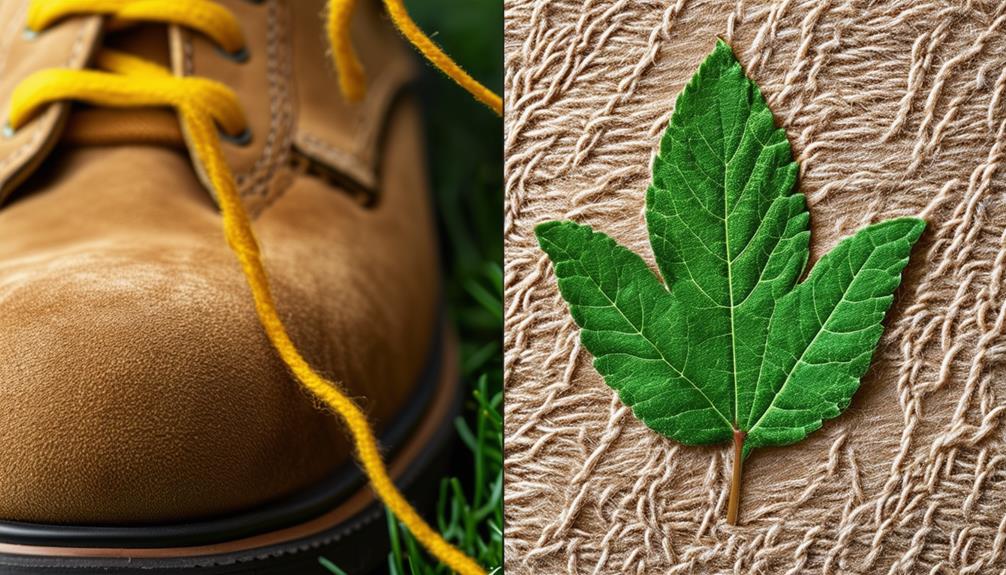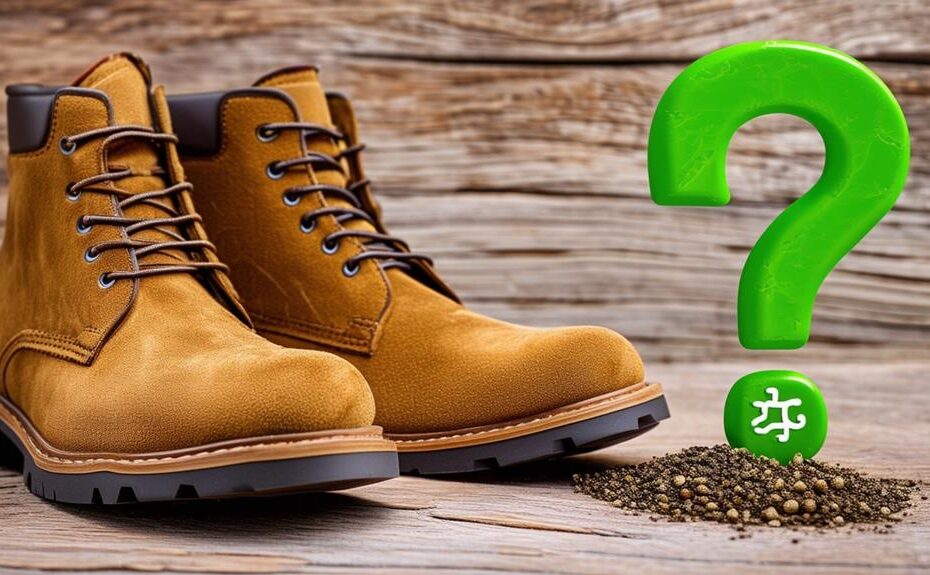You're wondering if nubuck, a type of leather often used in shoes, upholstery, and clothing, is vegan. Unfortunately, traditional nubuck is not vegan because it's typically made from animal hides, often with non-vegan coatings like lanolin. But, there's a silver lining! You can opt for microsuede, a synthetic material that offers a cruelty-free option similar in look and feel to nubuck. Cruelty-free and eco-friendly, microsuede is revolutionizing the fashion industry. Want to learn more about vegan-friendly alternatives and what makes them tick?
Microsuede's Vegan Roots Explored
As you delve into the world of vegan alternatives, you'll discover that microsuede, a synthetic material made from polyester microfibers, has become a popular substitute for nubuck in the fashion and upholstery industries.
Since nubuck isn't vegan, being a type of leather made from animal hides, microsuede offers a cruelty-free option that's similar in look and feel. This vegan nubuck alternative is made from polyester microfibers, making it a great choice for those who care about animal welfare.
By choosing microsuede over nubuck, you're supporting both animal welfare and environmental sustainability. Many brands now offer microsuede options, providing stylish and cruelty-free alternatives to nubuck.
When shopping for vegan-friendly products, look for microsuede as a reliable substitute for nubuck. With its synthetic material and similar texture, microsuede is an excellent choice for those committed to a vegan lifestyle.
Nubuck's Synthetic Leather Secret
You're likely wondering what makes synthetic nubuck so special.
The secret lies in its microfiber construction, which is often a blend of polyester and other materials.
When you delve into the world of vegan nubuck, you'll come across a wide range of microfiber options, each with its own unique characteristics and benefits.
Microfiber Nubuck Options Abound
As you navigate the world of microfiber nubuck, you'll come across a range of creative options that replicate the look and feel of real leather.
You can choose from a variety of blends, including 1. Polyester Microfiber Blend Fabric, 2. Recycled Plastic Fabric Blend, and 3. Tencel Lyocell Blend Fabric, each offering unique characteristics and benefits.
Polyester Microfiber Blend Fabric
One of the most impressive synthetic leather secrets lies in the polyester microfiber blend fabric, which has revolutionized the production of vegan nubuck. This suede-made material mimics the look and feel of natural nubuck, providing a velvety texture and appearance. It's durable, easy to clean, and perfect for upholstery covers and more.
| Characteristics | Description |
|---|---|
| Texture | Velvety and soft |
| Appearance | Luxurious and suede-like |
| Durability | Long-lasting and resistant |
| Cleanliness | Easy to clean and maintain |
| Versatility | Suitable for upholstery, handbags, and footwear |
Recycled Plastic Fabric Blend
By incorporating recycled plastic fabric blends, manufacturers can create vegan nubuck that not only reduces waste but also offers a sustainable alternative to traditional leather.
You'll be happy to know that these eco-friendly blends help minimize environmental impact.
As a result, you can enjoy a cruelty-free, vegan nubuck that's kind to animals and the planet.
Tencel Lyocell Blend Fabric
You'll often stumble upon Tencel Lyocell blend fabric, a sustainable and vegan-friendly material that's being used to create high-quality, synthetic nubuck alternatives. This eco-friendly fabric combines wood pulp cellulose with organic cotton, creating a soft, breathable, and durable material. Here's a comparison of Tencel Lyocell and traditional nubuck:
| Tencel Lyocell | Traditional Nubuck | |
|---|---|---|
| Material | Wood pulp cellulose, organic cotton | Animal hides |
| Sustainability | Eco-friendly, biodegradable | Resource-intensive, non-biodegradable |
| Durability | Soft, breathable, durable | Durable, but prone to cracking |
| Look and Feel | Velvety, smooth | Velvety, smooth |
| Vegan-Friendliness | Vegan-friendly | Non-vegan
Polyester Microfiber Core Blend
As you delve into the world of synthetic nubuck, you'll find that polyester microfiber core blends are just the beginning. You can also come across alternatives made from a combination of inventive materials, including:
- Cotton-Polyester Blend Fabric
- Bamboo-Derived Synthetic Fibers
- Soy-Based Protein Fibers
These eco-friendly and cruelty-free options are revolutionizing the fashion industry, and you're about to learn how.
Cotton-Polyester Blend Fabric
The cotton-polyester blend fabric at the heart of synthetic nubuck's production process is what sets it apart from its traditional animal-derived counterpart.
You'll find that this progressive blend is key to creating a sustainable, cruelty-free alternative.
The cotton adds strength, while the polyester provides a soft, velvety feel, making synthetic nubuck a convincing substitute for the real thing.
Bamboo-Derived Synthetic Fibers
By incorporating bamboo-derived synthetic fibers into the production process, manufacturers can create a vegan-friendly nubuck that's not only sustainable but also remarkably similar in texture and appearance to its traditional counterpart.
You'll find that these fibers provide a durable, soft, and luxurious feel, making them an excellent alternative to traditional leather or animal-derived nubuck.
Soy-Based Protein Fibers
You'll be surprised to learn that the secret to nubuck's synthetic leather lies in its polyester microfiber core blend, which is reinforced with soy-based protein fibers.
These fibers give nubuck its soft, velvety texture, making it a durable and sustainable alternative to traditional leather.
The soy-based fibers also contribute to reducing the environmental impact of traditional leather production.
Lanolin in Nubuck Coatings

As you navigate the world of nubuck, you'll find that some coatings contain lanolin, a waxy substance derived from sheep's wool. This natural ingredient adds softness and water resistance to nubuck, but it's not vegan-friendly.
You'll need to check product labels or contact manufacturers to find out if lanolin is used in the nubuck coatings you're interested in.
Wool-Derived Lanolin Coating
While you investigate the world of nubuck leather, you'll encounter different coatings that improve its appearance and performance. However, some of these coatings may not align with vegan principles. For example, you'll want to be aware of lanolin, a wool-derived wax, along with other non-vegan coatings, such as:
- Beeswax in lanolin coating
- Silk-derived finishing agent
- Gelatin-based suede finisher
Ensure to check the ingredients and processes involved in the production of nubuck leather to make an informed and ethical choice.
Beeswax in Lanolin Coating
Beeswax, often paired with lanolin in nubuck coatings, poses another obstacle for vegan consumers seeking animal-free products. This animal-derived ingredient is commonly used to enhance the water-repellent properties of nubuck. When shopping for nubuck items, it's essential to check the label for beeswax or lanolin to ensure alignment with vegan principles.
| Ingredient | Vegan-Friendly |
|---|---|
| Lanolin | ❌ |
| Beeswax | ❌ |
| Synthetic Coatings | ✔️ |
| Plant-Based Coatings | ✔️ |
| Animal-Derived Coatings | ❌ |
Silk-Derived Finishing Agent
You may think lanolin is the only animal-derived finishing agent used in nubuck coatings, but there's another silk-derived substance that raises concerns for vegan consumers.
This silk-derived finishing agent is used to improve the softness and shine of nubuck leather.
As you investigate nubuck products, be aware of these multiple animal-derived components that might impact your purchasing decisions.
Gelatin-Based Suede Finisher
When examining nubuck products, you'll often find a gelatin-based suede finisher that contains lanolin, a natural oil derived from sheep's wool. Lanolin provides softness and water resistance, but its wool-derived origin makes it non-vegan.
This raises concerns for vegan consumers. Be cautious of lanolin-containing nubuck finishes when choosing cruelty-free alternatives.
Silk-Derived Animal By-Products Used
When you investigate the ingredients used in nubuck coatings, you'll discover that some manufacturers incorporate silk-derived animal by-products. These can include:
1) Cashmere-Derived Finishing Agent
2) Musk-Derived Suede Finisher
3) Honey-Based Suede Finisher
These ingredients might surprise you. It's crucial to be aware of these ingredients if you're a vegan consumer looking for cruelty-free options.
Cashmere-Derived Finishing Agent
Lanolin, a wax extracted from sheep's wool, plays a crucial role in nubuck coatings. It provides a soft and smooth finish that many consumers have come to expect from high-quality leather products.
You might be surprised to learn that lanolin is a by-product of the cashmere industry. This makes nubuck coatings indirectly linked to animal-derived materials.
Musk-Derived Suede Finisher
You might be surprised to learn that some nubuck coatings also rely on musk-derived suede finishers, which, like lanolin, raise concerns about the vegan status of these materials.
Lanolin, sourced from sheep's wool, is often used to create a suede-like finish. This non-vegan ingredient can be hidden in nubuck coatings, making it important to check the ingredients for vegan-friendly options.
Honey-Based Suede Finisher
Honey-based suede finishers provide a vegan alternative to lanolin-containing nubuck coatings, offering a cruelty-free solution for consumers seeking animal-free products.
You can choose these honey-based finishers to guarantee that lanolin, which is derived from sheep's wool and considered non-vegan, isn't used.
This alternative guarantees that your nubuck products align with your values and lifestyle choices.
Snake Oil Finishing Agent
When shopping for nubuck products, it's important to scrutinize the ingredients, as some manufacturers use lanolin, a silk-derived animal by-product, as a snake oil finishing agent.
This natural oil from sheep's wool is used for its softening and conditioning properties, but its presence raises concerns for vegans seeking animal-free products.
Vegan Suede's Eco-Friendly Future
As consumers increasingly prioritize eco-friendly choices, vegan suede is poised to revolutionize the fashion and textile industries with its sustainable, cruelty-free appeal. You're likely wondering what makes vegan suede so eco-friendly. Here's a breakdown:
| Benefits | Why it Matters |
|---|---|
| Cruelty-free | No animal hides are used, reducing harm to animals |
| Sustainable | Made from polyester microfibers, reducing waste and pollution |
| Durable | Long-lasting, reducing the need for frequent replacements |
| Easy to clean | Reduces water and detergent usage |
| Versatile | Suitable for upholstery, fashion, and more |
Frequently Asked Questions
What Is Nubuck Made Of?
You're wondering what nubuck is made of? Well, it's typically crafted from the top grain of leather, which makes it super durable and resistant to wear, and its velvety surface is achieved through sanding or buffing.
Can Vegans Wear Suede?
You can't wear traditional suede as it's made from animal hides, but you can opt for vegan alternatives like microsuede or coffee leather, which align with your values and reduce harm to animals and the environment.
What Is the Vegan Alternative to Suede?
You're looking for vegan alternatives to suede, and luckily, you've got options! Microsuede, coffee leather, and other animal-free materials are available, and brands like Banana Republic offer stylish, cruelty-free choices that align with your values.
What's the Difference Between Nubuck and Leather?
You're wondering what distinguishes nubuck from leather. In essence, nubuck is a type of leather, but it's sanded to create a velvety texture, whereas regular leather has a smooth finish.
Conclusion
So, is nubuck vegan?
Unfortunately, it's not. While some nubuck is made from synthetic materials, many products still contain lanolin, an animal-derived coating.
Microsuede, on the other hand, is a vegan-friendly alternative.
As consumers become more eco-conscious, vegan suede options are emerging, offering a more sustainable future for fashion.
By understanding the materials and production processes behind nubuck and microsuede, you can make informed choices that align with your values and lifestyle.
